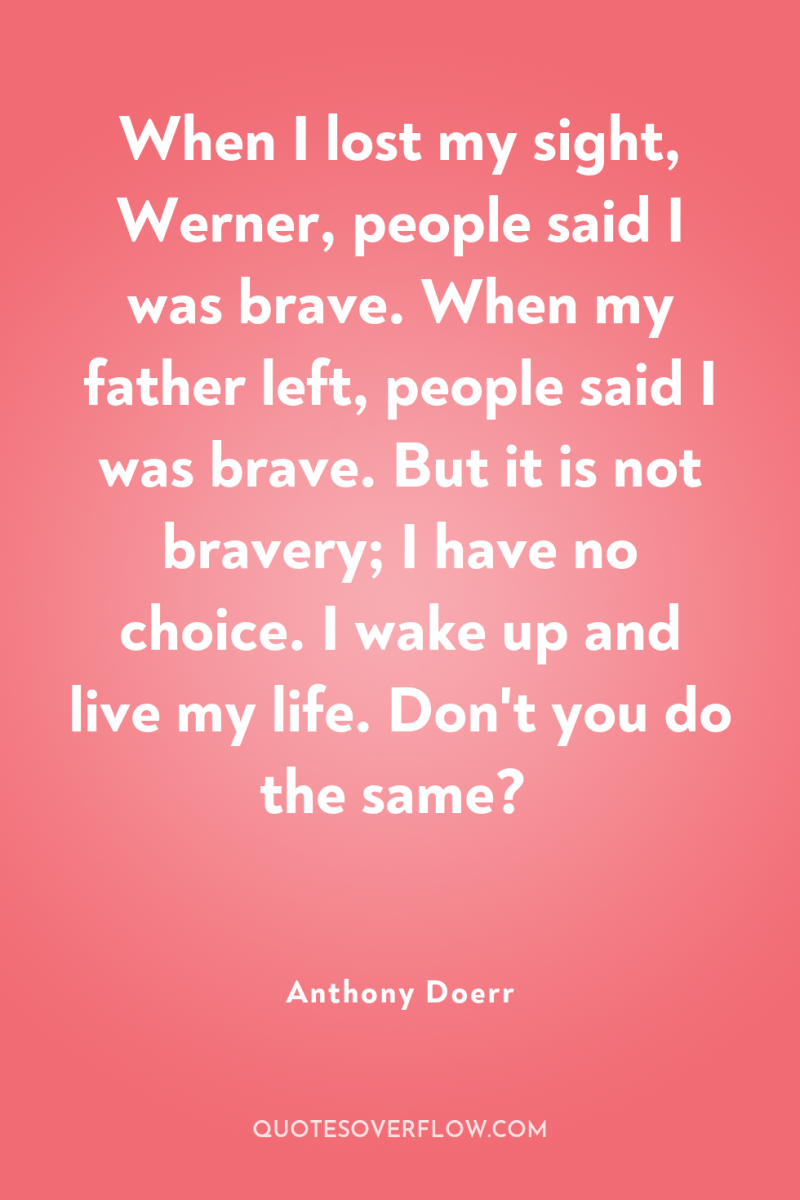
1
When I lost my sight, Werner, people said I was brave. When my father left, people said I was brave. But it is not bravery; I have no choice. I wake up and live my life. Don't you do the same?Anthony Doerr
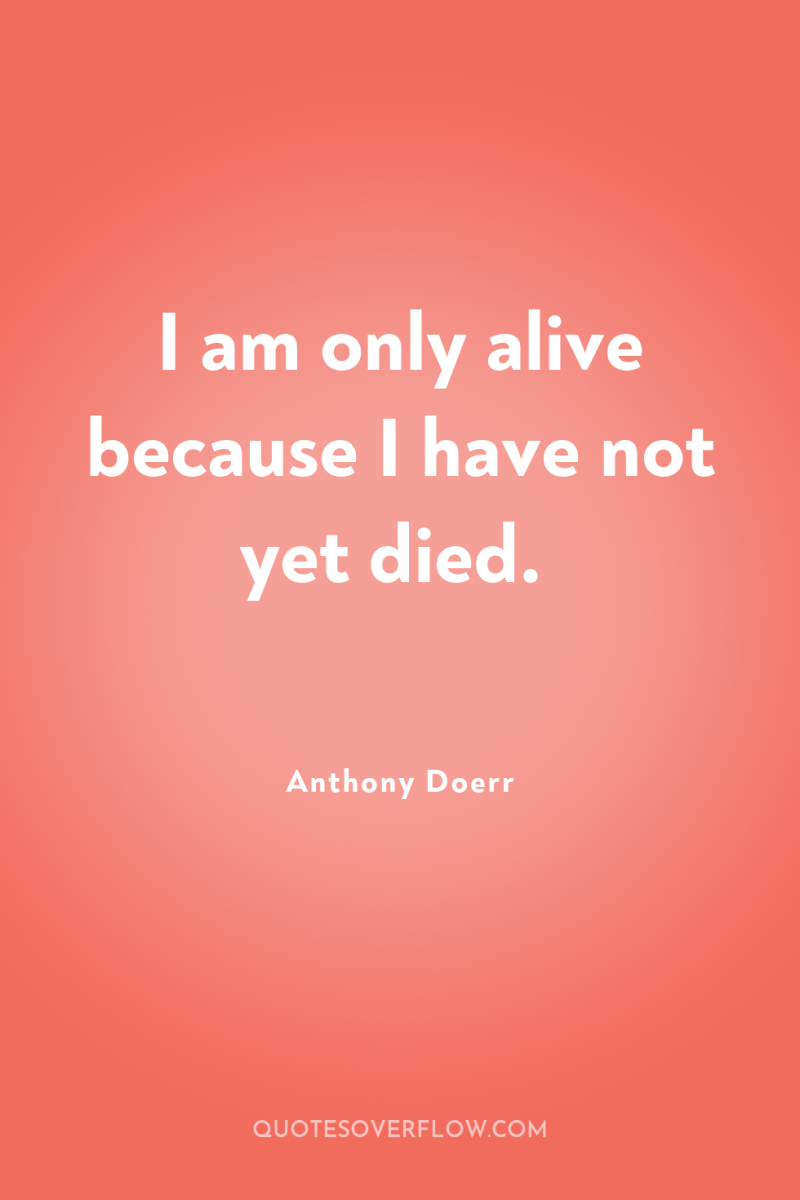
2
I am only alive because I have not yet died.Anthony Doerr
3
One night he sits up. In cots around him are a few dozen sick or wounded. A warm September wind pours across the countryside and sets the walls of the tent rippling. Werner’s head swivels lightly on his neck. The wind is strong and gusting stronger, and the corners of the tent strain against their guy ropes, and where the flaps at the two ends come up, he can see trees buck and sway. Everything rustles. Werner zips his old notebook and the little house into his duffel and the man beside him murmurs questions to himself and the rest of the ruined company sleeps. Even Werner’s thirst has faded. He feels only the raw, impassive surge of the moonlight as it strikes the tent above him and scatters. Out there, through the open flaps of the tent, clouds hurtle above treetops. Toward Germany, toward home. Silver and blue, blue and silver. Sheets of paper tumble down the rows of cots, and in Werner’s chest comes a quickening. He sees Frau Elena kneel beside the coal stove and bank up the fire. Children in their beds. Baby Jutta sleeps in her cradle. His father lights a lamp, steps into an elevator, and disappears. The voice of Volkheimer: What you could be. Werner’s body seems to have gone weightless under his blanket, and beyond the flapping tent doors, the trees dance and the clouds keep up their huge billowing march, and he swings first one leg and then the other off the edge of the bed.“ Ernst, ” says the man beside him. “Ernst.” But there is no Ernst; the men in the cots do not reply; the American soldier at the door of the tent sleeps. Werner walks past him into the grass. The wind moves through his undershirt. He is a kite, a balloon. Once, he and Jutta built a little sailboat from scraps of wood and carried it to the river. Jutta painted the vessel in ecstatic purples and greens, and she set it on the water with great formality. But the boat sagged as soon as the current got hold of it. It floated downstream, out of reach, and the flat black water swallowed it. Jutta blinked at Werner with wet eyes, pulling at the battered loops of yarn in her sweater.“ It’s all right, ” he told her. “Things hardly ever work on the first try. We’ll make another, a better one.” Did they? He hopes they did. He seems to remember a little boat–a more seaworthy one–gliding down a river. It sailed around a bend and left them behind. Didn’t it? The moonlight shines and billows; the broken clouds scud above the trees. Leaves fly everywhere. But the moonlight stays unmoved by the wind, passing through clouds, through air, in what seems to Werner like impossibly slow, imperturbable rays. They hang across the buckling grass. Why doesn’t the wind move the light? Across the field, an American watches a boy leave the sick tent and move against the background of the trees. He sits up. He raises his hand.“ Stop, ” he calls.“ Halt, ” he calls. But Werner has crossed the edge of the field, where he steps on a trigger land mine set there by his own army three months before, and disappears in a fountain of earth. .Anthony Doerr
4
Time is a slippery thing: lose hold of it once, and its string might sail out of your hands forever.Anthony Doerr
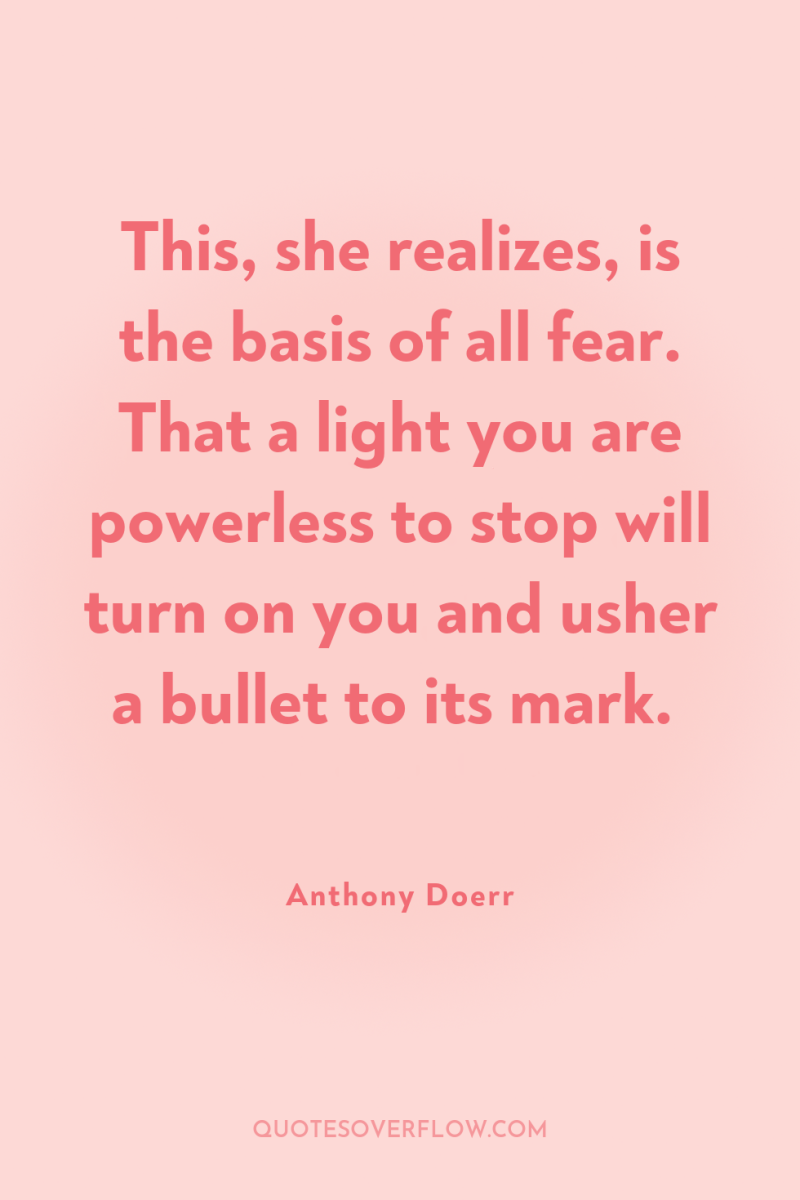
5
This, she realizes, is the basis of all fear. That a light you are powerless to stop will turn on you and usher a bullet to its mark.Anthony Doerr

6
What the war did to dreamers.Anthony Doerr
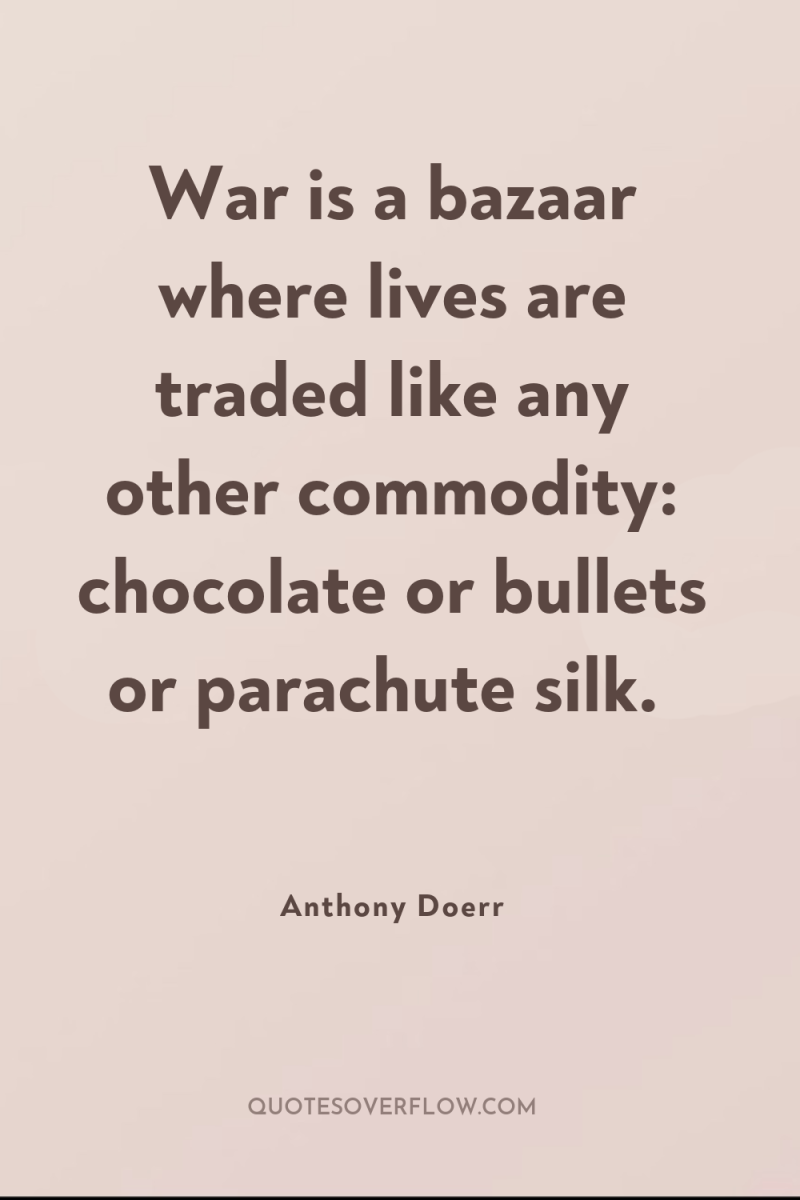
7
War is a bazaar where lives are traded like any other commodity: chocolate or bullets or parachute silk.Anthony Doerr
8
People walk the paths of the gardens below, and the wind sings anthems in the hedges, and the big old cedars at the entrance to the maze creak. Marie-Laure imagines the electromagnetic waves traveling into and out of Michel’s machine, bending around them, just as Etienne used to describe, except now a thousand times more crisscross the air than when he lived - maybe a million times more. Torrents of text conversations, tides of cell conversations, of televisions programs, of e-mails, vast networks of fiber and wire interlaced above and beneath the city, passing through buildings, arcing between transmitters in Metro tunnels, between antennas atop buildings, from lampposts with cellular transmitters in them, commercials for Carrefour and Evian and prebaked toaster pastries flashing into space and back to earth again, I am going to be late and Maybe we should get reservations? and Pick up avocados and What did he say? and ten thousand I miss yous, fifty thousand I love yous, hate mail and appointment reminders and market updates, jewelry ads, coffee ads, furniture ads flying invisibly over the warrens of Paris, over the battlefields and tombs, over the Ardennes, over the Rhine, over Belgium and Denmark, over the scarred and ever-shifting landscape we call nations. And is it so hard to believe that souls might also travel those paths? That her father and Etienne and Madame Manec and the German boy named Werner Pfennig might harry the sky in flocks, like egrets, like terns, like starlings? That great shuttles of souls might fly about, faded but audible if you listen closely enough? They flow above the chimneys, ride the sidewalks, slip through your jacket and shirt and breastbone and lungs, and pass out through the other side, the air a library and the record of every life lived, every sentence spoken, every word transmitted still reverberating within it. Every hour, she thinks, someone for whom the war was memory falls out of the world. We rise again in the grass. In the flowers. In songs.Anthony Doerr
9
That afternoon, long after the stool has been put away and the waltzes have stopped, while Werner sits with his transceiver listening to nothing, a little redheaded girl in a maroon cape emerges from a doorway, maybe six or seven years old, small for her age, with big clear eyes that remind him of Jutta’s. She runs across the street to the park and plays there alone, beneath the budding trees, while her mother stands on the corner and bites the tips of her fingers. The girl climbs into the swing and pendulums back and forth, pumping her legs, and watching her opens some valve in Werner’s soul. This is life, he thinks, this is why we live, to play like this on a day when winter is finally releasing its grip. .Anthony Doerr

10
What the war did to the dreamers.Anthony Doerr
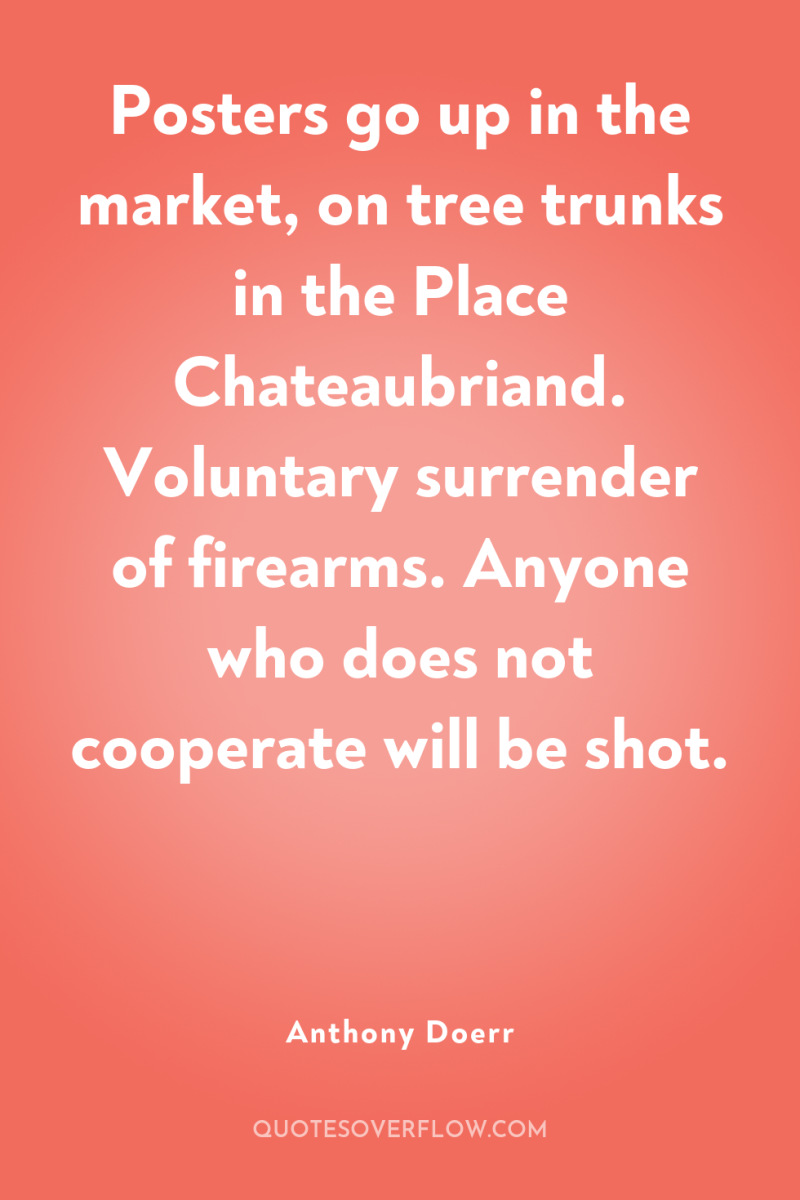
11
Posters go up in the market, on tree trunks in the Place Chateaubriand. Voluntary surrender of firearms. Anyone who does not cooperate will be shot.Anthony Doerr
12
But the huge bowl of the sky remains untracked: no zeppelins, no bombers, no superhuman paratroopers, just the last songbirds returning from their winter homes, and the quicksilver winds of spring transmuting into the heavier, greener breezes of summer.Anthony Doerr

13
They can march for days without eating. They impregnate every schoolgirl they meet.Anthony Doerr
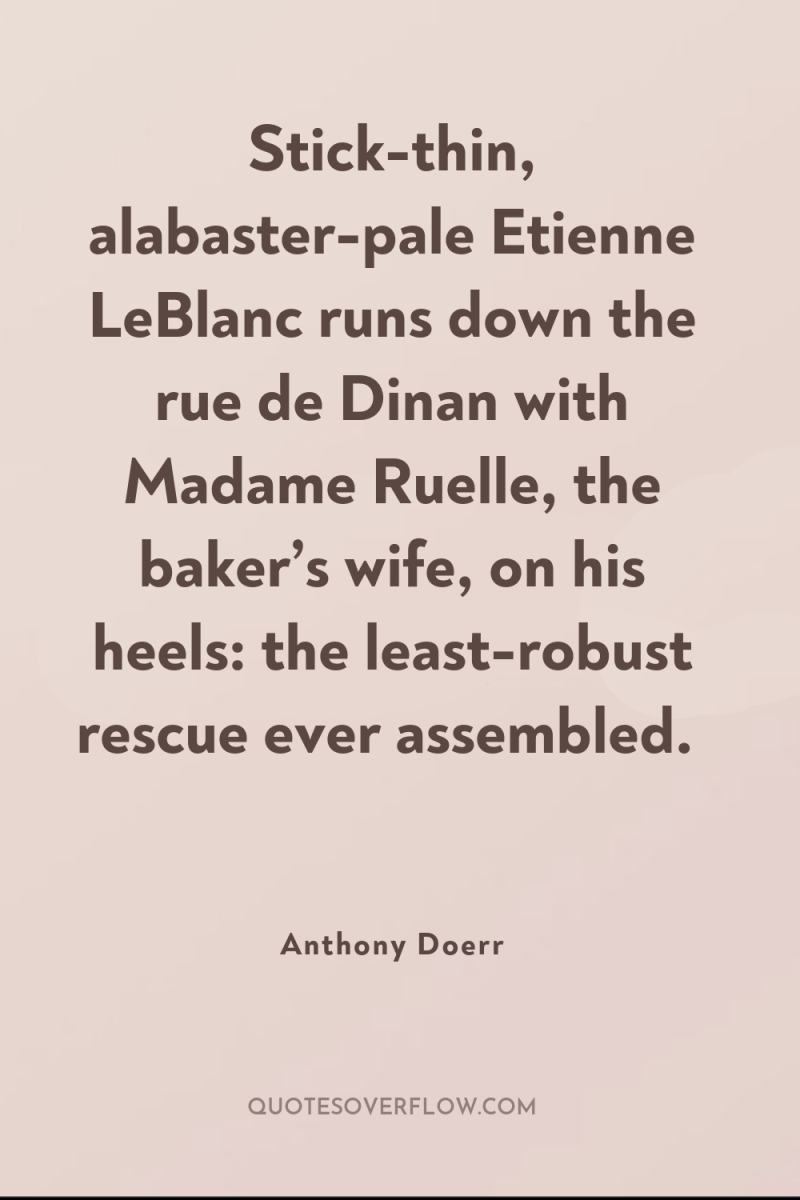
14
Stick-thin, alabaster-pale Etienne LeBlanc runs down the rue de Dinan with Madame Ruelle, the baker’s wife, on his heels: the least-robust rescue ever assembled.Anthony Doerr
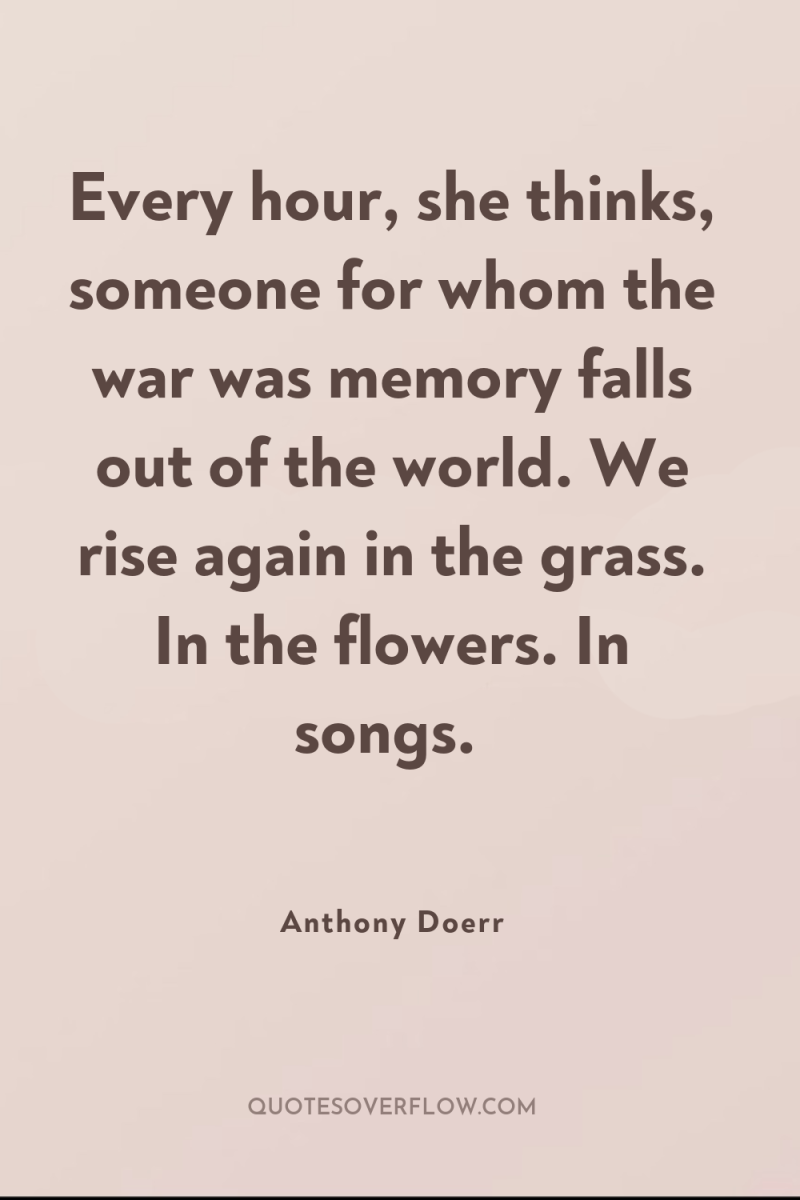
15
Every hour, she thinks, someone for whom the war was memory falls out of the world. We rise again in the grass. In the flowers. In songs.Anthony Doerr
16
Even the poorest pit houses usually possess a state-sponsored Volkempfanger VE301, a mass-produced radio stamped with an eagle and a swastika, incapable of shortwave, marked only for German frequencies. Radio: it ties a million ears to a single mouth. Out of loudspeakers all around Zollverein, the staccato voice of the Reich grows like some imperturbable tree; its subjects lean toward its branches as if toward the lips of God.Anthony Doerr
17
You know the greatest lesson of history? It's that history is whatever the victors say it is... Whoever wins, that's who decides the history.Anthony Doerr
18
He sweeps her hair back from her ears; he swings her above his head. He says she is his émerveillement. He says he will never leave her, not in a million years.Anthony Doerr
19
And one cold Tuesday in December, when Marie-Laure has been blind for over a year, her father walks her up rue Cuvier to the edge of the Jardin des Plantes."Here, ma chérie, is the path we take every morning. Through the cedars up ahead is the Grand Gallery.""I know, Papa."He picks her up and spins her around three times. "Now, " he says, "you're going to take us home." Her mouth drops open." I want you to think of the model, Marie.""But I can't possibly! "" I'm one step behind you. I won't let anything happen. You have your cane. You know where you are."" I do not! "" You do." Exasperation. She cannot even say if the gardens are ahead or behind." Calm yourself, Marie. One centimeter at a time."" I'm far, Papa. Six blocks, at least."" Six blocks is exactly right. Use logic. Which way should we go first?" The world pivots and rumbles. Crows shout, brakes hiss, someone to her left bangs something metal with what might be a hammer. She shuffles forward until the tip of her cane floats in space. The edge of a curb? A pond, a staircase, a cliff? She turns ninety degrees. Three steps forward. Now her cane finds the base of a wall. "Papa?""I'm here." Six paces seven paces eight. A roar of noise - an exterminator just leaving a house, pump bellowing - overtakes them. Twelve paces farther on, the bell tied around the handle of a shop door rings, and two women came out, jostling her as they pass. Marie- Laure drops her cane; she begins to cry. Her father lifts her, holds her to his narrow chest." It's so big, " she whispers." You can do this, Marie."She cannot.Anthony Doerr
20
A girl got kicked out of the swimming hole today. Inge Hachmann. They said they wouldn’t let us swim with a half-breed. Unsanitary. A half-breed, Werner. Aren’t we half-breeds too? Aren’t we half our mother, half our father?Anthony Doerr
21
Up and down the lanes, the last unevacuated townspeople wake, groan, sigh. Spinsters, prostitutes, men over sixty. Procrastinators, collaborators, disbelievers, drunks. Nuns of every order. The poor. The stubborn. The blind.Anthony Doerr
22
Don't you ever get tired of believing, Madame? Don't you ever want proof?Anthony Doerr
23
The moonlight shines and billows; the broken clouds scud above the trees. Leaves fly everywhere. But the moonlight stays unmoved by the wind, passing through clouds, through air, in what seems to Werner like impossibly slow imperturbable rays. They hang across the buckling grass. Why doesn’t the wind move the light?Anthony Doerr
24
She has no memories of her mother but imagines her as white, a soundless brilliance. Her father radiates a thousand colors, opal, strawberry red, deep russet, wild green; a smell like oil and metal, the feel of a lock tumbler sliding home, the sound of his key rings chiming as he walks.Anthony Doerr
25
That something so small could be so beautiful. Worth so much. Only the strongest people can turn away from feelings like that.Anthony Doerr
26
The very life of any creature is a quick-fading spark in fathomless darkness.Anthony Doerr
27
It's embarrassingly plain how inadequate language is.Anthony Doerr
28
The universe is full of fuel.Anthony Doerr
29
There is pride, too, though - pride that he has done it alone. That his daughter is so curious, so resilient. There is the humility of being a father to someone so powerful, as if he were only a narrow conduit for another, greater thing. That's how it feels right now, he thinks, kneeling beside her, rinsing her hair: as though his love for his daughter will outstrip the limits of his body. The walls could fall away, even the whole city, and the brightness of that feeling would not wane.Anthony Doerr
30
She is in charge of everything, but no one knows. It is a tremendous burden, she says, to be responsible for every little thing, every infant born, every leaf falling from every tree, every wave that breaks onto the beach, every ant on its journey.Anthony Doerr
31
Then help us.”“ I don’t want to make trouble, Madame.”“Isn’t doing nothing a kind of troublemaking?”“ Doing nothing is doing nothing.”“ Doing nothing is as good as collaborating.” …“It’s not a person you wish to fight, Madame, it’s a system. How do you fight a system?”“ You try.Anthony Doerr
32
On the rue de la Crosse, the Hotel of Bees becomes almost weightless for a moment, lifted in a spiral of flame, before it begins to rain the pieces back to the earthAnthony Doerr
33
Graceful. Lean. Coordinated as she whirls, though how she knows what dancing is, [her grandfather] could never guess. The song plays on. He lets it go too long. The antenna is still up, probably dimly visible against the sky, the whole attic might as well shine like a beacon. But in the candlelight, in the sweet rush of a concerto, Marie-Laure bites her lower lip, and her face gives off a secondary glow, reminding him of the marshes beyond the town walls, in those winter dusks when the sun has set but isn't fully swallowed, and big patches of red pools of light burn - places he used to go with his brother, in what seems like lifetimes ago. .Anthony Doerr
34
---on her best days, she glimpses the limitless span of millennia behind her: millions of years, tens of millions.Anthony Doerr
35
How about peaches, dear?” murmurs Madame Manec, and Marie-Laure can hear a can opening, juice slopping into a bowl. Seconds later, she’s eating wedges of wet sunlight.Anthony Doerr
36
Silence is the fruit of occupation.Anthony Doerr
37
I wasn't trying to reach England. or Paris. I thought that if I made the broadcast powerful enough, my brother would hear me. That I could bring him some peace, protect him as he had always protected me." You'd play your brother's own voice to him? After he died?"" And Debussy." Did he ever talk back?" The attic ticks. What ghosts sidle along the walls right now, trying to overhear? She can almost taste her great-uncle's fright in the air. "No, " he says. "He never did. .Anthony Doerr
38
I have been feeling very clearheaded lately and what I want to write about today is the sea. It contains so many colors. Silver at dawn, green at noon, dark blue in the evening. Sometimes it looks almost red. Or it will turn the color of old coins. Right now the shadows of clouds are dragging across it, and patches of sunlight are touching down everywhere. White strings of gulls drag over it like beads. It is my favorite thing, I think, that I have ever seen. Sometimes I catch myself staring at it and forget my duties. It seems big enough to contain everything anyone could ever feel. .Anthony Doerr
39
The grotto itself comprises its own slick universe, and inside this universe spin countless galaxies: here, in the upturned half of a single mussel shell, lives a barnacle and a tiny spindle shell occupied by a still smaller hermit crab. And on the shell of the crab? A yet smaller barnacle. And on that barnacle?Anthony Doerr
40
There are, he assures her, no such things as curses. There is luck, maybe, bad or good. A slight inclination of each day towards success or failure. But no curses.Anthony Doerr
41
There are, he assures her, no such things as curses. There is luck, maybe, bad or good. A slight indication of each day toward success or failure. But no curses.Anthony Doerr
42
It is my favorite thing, I think, that I have ever seen. Sometimes I catch myself staring at it and forget my duties. It seems big enough to contain everything anyone could ever feel.Anthony Doerr
43
There has always been a sliver of panic in him, deeply buried, when it comes to his daughter: a fear that he is no good as a father, that he is doing everything wrong. That he never quite understood the rules. …There is pride, too, though—pride that he has done it alone. That his daughter is so curious, so resilient. There is the humility of being a father to someone so powerful, as if he were only a narrow conduit for another, greater thing. That’s how it feels right now, he thinks, kneeling beside her, rinsing her hair: as though his love for his daughter will outstrip the limits of his body. The walls could fall away, even the whole city, and the brightness of that feeling would not wane. .Anthony Doerr
44
Whenever he can, Werner records what the partisans say on magnetic tape. Everybody, he is learning, likes to hear themselves talk. Hubris, like the oldest stories. They raise the antenna too high, broadcast for too many minutes, assume the world offers safety and rationality when of course it does not.Anthony Doerr